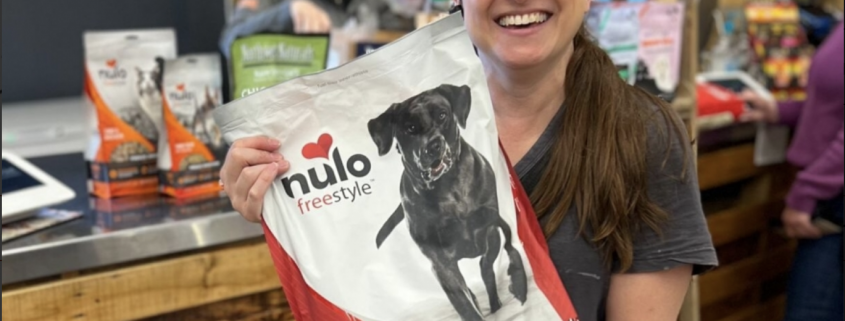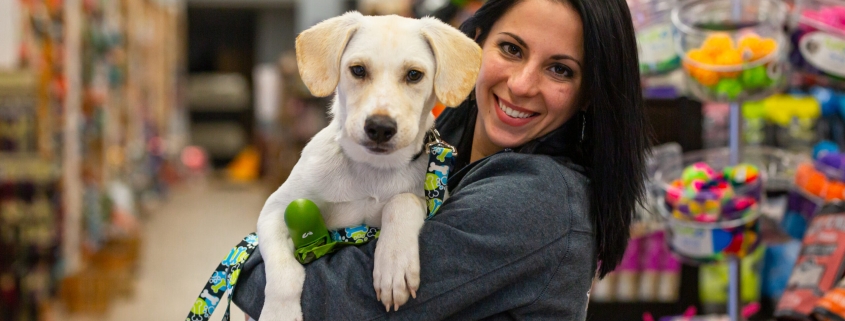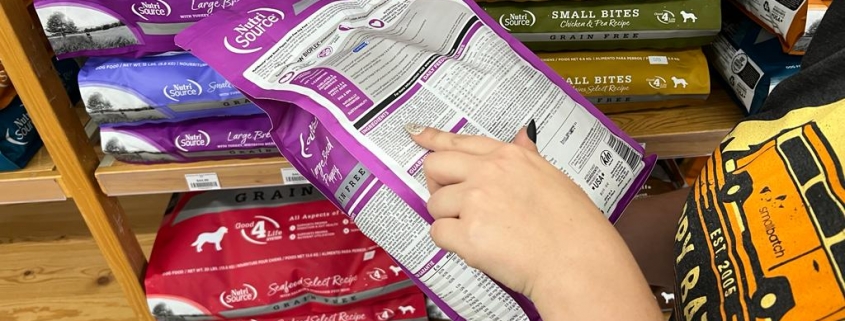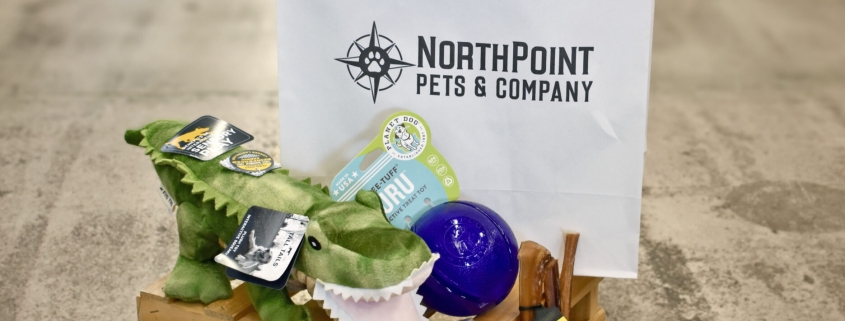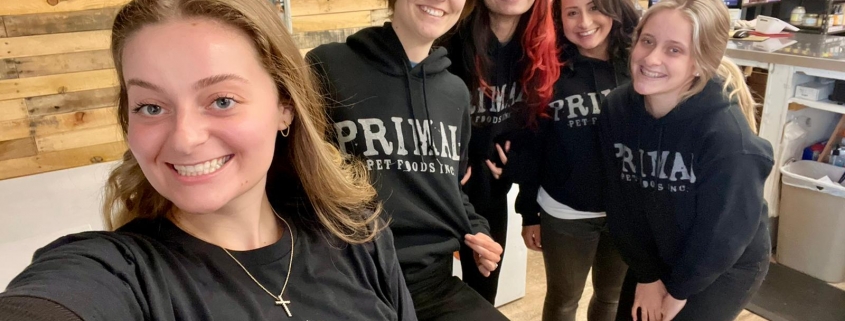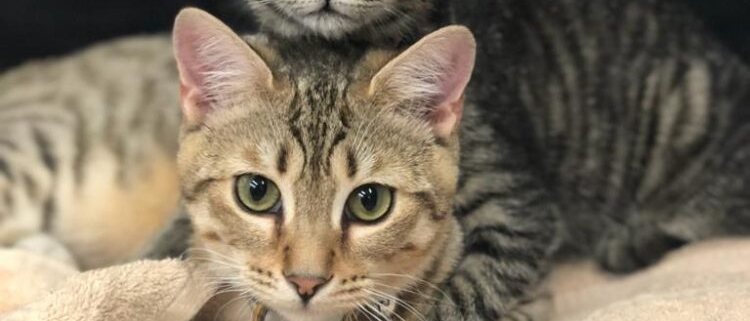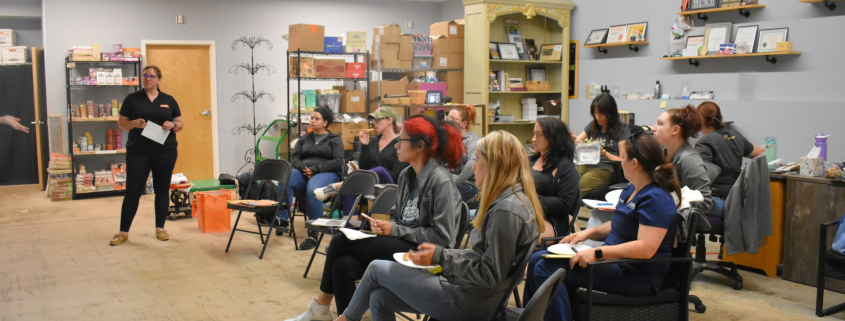Frequent Shoppers Earn Free Products!
/ NorthPoint PetsMany of our food, treats and even supplement brands offer frequent buyer rewards! Every qualifying purchase gets you one step closer!
Q & A with Nicci Cammack
/ Jenna HarrisonCaitlin: What is your favorite supplement and why?
Anything fresh – I am an advocate for adding fresh food in every pet’s bowl (even in small amounts). In my experience, small additions of fresh fruit, veggies and lean meats can make a profound difference.
Beth: What got you interested in animal nutrition?
Like many in this industry, it was my own sick pet that was the catalyst for diving into animal nutrition. Many don’t realize that I came from the human side, and soon realized that the animal nutrition field does not have the depth of research and options that human nutrition does.
Ashley: What supplement is beneficial for all pets’ health?
Short answer: None. Long answer is that every pet is different, and therefore they have unique needs that are based on genetics, lifestyle, breed, age and diet.
Savannah: As a small business owner, what do you consider to be your most noteworthy accomplishment?
The team that works here. Building a successful team that works together is no small feat, and without each of you NPP wouldn’t exist.
Leah: What was life like before your adventure with NPP?
From a professional level, l held several different positions that helped to shape my education and experiences: paramedic, pharmaceutical research and medical education. Prior to NPP I traveled often throughout the country and even internationally for various medical/nutrition related meetings and events.
Tina: What would be your dream position be once you finish getting your PhD in canine nutrition?
There are a very small handful of PhD canine nutritionists in the entire world and there is a large need for more and a very large education and research gap for canine (and feline) nutrition. Many people don’t realize that many brands of pet food are never formulated or reviewed by a qualified PhD nutritionist. Therefore I believe the largest impact could be made by teaching other graduate students and veterinarians at the University level to elevate the pet food industry to do proper research and make meaningful research contributions to both human and animal health.
Nikki: What has been your most impactful success story during your time doing nutrition counseling?
This is a tough question. We at NPP know that most pets improve with even incremental changes to their diets. Considering this, I think that success in that space is helping pet parents to see the bigger picture and why nutrition is fundamental to health and wellness.
Jenna: Everyone at NPP has learned so much from you. What have you learned from the team?
I am continually learning from this team. It’s probably not common knowledge that I had zero small business experience or full ‘people management experience. Everyone here is incredibly talented at problem-solving, adapting to change and speaking up when they have ideas – and we foster this environment! This approach has allowed each of us to learn and grow together and therefore each and everyone that is a member of this team has contributed to the success of NPP.
Missy: What is your ultimate goal after you complete your PhD?
The purpose of a Ph.D. is to learn how to do research. Another part is often to teach younger students of the same field you’re completing your doctorate in. I’m looking forward to doing both of these things and contributing advancements to the field of canine nutrition.
Asking the important questions now…can we see some pictures of your pets?
[vc_single_image image=”5834″ img_size=”large”]
Redefining Transparency: a dirty word
/ Nicole R. Cammack
Transparency rarely exists in the pet industry. Despite what marketing tells us. So how do we fix it?
There are a lot of products and companies that make health claims and clean sourcing that aim to provide a certain level of comfort to the consumer. However, most companies are not willing or able to prove it. Simple email requests for documentation of processes and testing from me, as a retailer, often go unanswered. The lack of response is sometimes from companies most pet owners know and trust. Believe it or not, some of these companies would surprise even the savviest pet owner.
So how did we get here?
There’s a widespread lack of data across food, supplement, and treat categories. For example, a lack of data exists to substantiate claims such as ancient grains prevent the risk of DCM (dilated cardiomyopathy or heart disease). Or that adding taurine to a product makes it heart-healthy. What about high-protein pet foods? There’s no benchmark to define what that means – or that it’s beneficial. Why? Because nobody has held these companies accountable for their claims. They’ve never needed to provide data to support these claims because nobody has ever really asked. One can make the argument that the lack of data from manufacturers opened the doors up for bad science behind the grain-free and heart disease debate to flourish. Simply, bad science won because there was inadequate data to support the effectiveness of grain-free food to provide adequate nutrition. Manufacturers were and still are silent because they are unable to stand behind their products and support the retailers who sell their products. Harsh, but true.
These are just some recent examples. Many products within the industry, including ones perceived as natural and high quality, lack actual measurable transparency and quality control. This means that their benefits, or claim of benefit, could easily be overshadowed by poor sourcing, toxins, and/or formulation.
What is measurable transparency?
For supplements, few companies do inbound testing on their raw ingredients or at least make those results public. Such testing would verify that the ingredient is what it says it is. It should also screen for toxic contaminants and ensure each ingredient has verification of origin and quality supply chain. In today’s pandemic economy, a company should be able to claim AND certify ingredients within their supplements or products that are not sourced from China. That final product should also have an analysis that confirms the targeted levels of active ingredients and reconfirms the lack of toxins.
When it comes to toxic screening, CBD is of particular concern, because it can be a highly toxic plant. This is because hemp performs a process called phytoremediation. Meaning that it absorbs heavy metals and many of the agricultural chemicals in the soil such as pesticides, herbicides, and fertilizers. Inbound raw ingredients should always be tested for these toxins – in addition to the final product. CBD and other supplement companies should openly provide this information – however the majority can’t because they do not conduct these tests.
For treats – the same applies. Do the inbound raw ingredients have quality control measures that allow the company to be fully transparent? Will that company shares those reports? These same transparency concerns also apply to pet food. We also see a general lack of transparency and accountability leaving both manufacturers and retailers open for potential problems. Establishing accountability simply starts with both pet owners and retailers asking these questions and demanding improvement. Change won’t happen overnight, but improvement has to start somewhere.
How do we redefine transparency?
It’s clear how transparency across nearly all pet categories is lacking. Transparency has become a feel-good word for those who don’t know any better. However, for those that do, it’s become a cringe-worthy tagline that is an Achilles heel.
The reality is that asking these questions and holding companies accountable is a path that most are hesitant to venture down. However, gone are the days of blind trust in manufacturers. Blind trust has cost the health and lives of many pets too many times to count. The definition of insanity is doing the same thing over and over again and expecting a different result. As pet owners and advocates, we need to start asking the tough questions to demand accountability for the betterment of the industry, and most importantly our pets.
Asking the tough questions:
The following is a general, but not complete, list of questions to ask for food, supplement, and treat manufacturers. Keep in mind that most companies will be unable to provide all the answers and that the goal is to encourage actual, rather than perceived, transparency. It will take time, but change will require asking these questions and ultimately basing buying and retail stocking decisions on the availability and willingness to provide satisfactory answers.
- Do you have verification of your supply chain and the origin of your ingredients?
- Do any of your raw materials come from China?
- Do you conduct inbound testing for active ingredients, pathogens and toxins for your raw materials?
- Do you conduct a 3rd party analysis of the active ingredients/nutrients contained within the final product?
- Do you conduct digestibility tests on all your final products? Just select formulas? Or none at all? Are those reports public?
- What is the digestibility of your final product?
- Do you conduct testing for pathogens and toxins for your final product? Do you hold those products from release until testing results reveal it is safe to do so?
What’s a Boredom Bag?
/ NorthPoint PetsOur pets need stimulation and engagement when we’re not home or can’t spend time with them. Let us create our best-selling Boredom Bag for your pet. Each bag is lovingly built with your pet’s unique needs and tastes in mind.
Why Do Cats Eat Grass?
/ NorthPoint PetsResearchers have identified why cats eat grass. It’s not when they’re feeling ill and need to throw up. You’d be surprised to learn the real reason why they munch on grass and what you can do if they have this habit.
Questions?
/ NorthPoint PetsOur team of in-store experts are always ready to answer your questions about pet nutrition as well as general pet care when you come visit us.
Always free of charge!
Why Do People Want to Work Here?
/ NorthPoint PetsNPP sets the standard when it comes to customer satisfaction. That comes from our devotion to your pets and the cutting-edge training and education each team member receives.
Crazy Catnip Kitties
/ NorthPoint PetsThere is plenty of folklore surrounding catnip. Catnip is addictive. Catnip makes cats angry. Or our favorite, catnip makes your cat hallucinate and see ghosts. Find out what really makes this natural herb in the mint family so pleasurable to your cat’s senses.
What Makes Our Team Special
/ Nicole R. CammackThe award-winning NorthPoint Pets team is a group of experienced and knowledgeable animal nutrition experts. We are here to help optimize your pet’s health!

Tuesday
Wednesday
Thursday
Friday
Saturday
Sunday
10am – 7pm
10am – 6pm
10am – 7pm
9am – 6pm
9am – 5pm
10am – 4pm
DIY Dog Wash closes one hour prior to store close.
Newsletter Sign-Up
Subscribe to get weekly tips, seasonal advice, and be the first to know about events, new products, sales, and more.
Newsletter Sign-Up
NorthPoint Pets is consistently recognized for excellence



